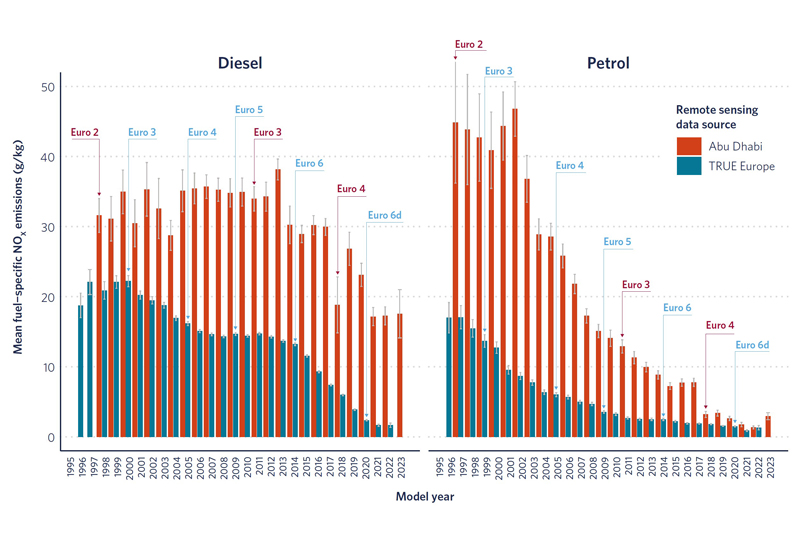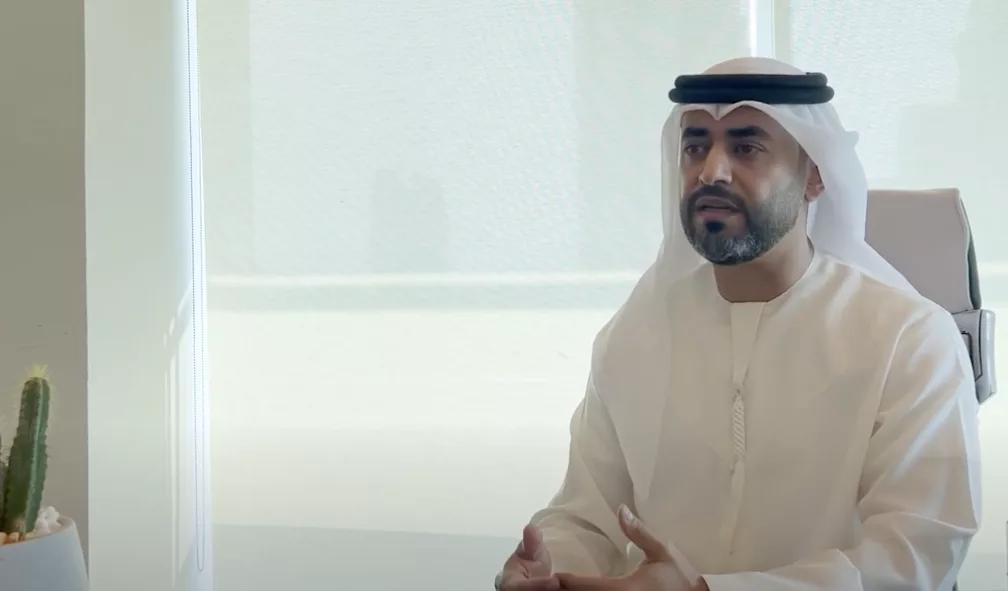New Abu Dhabi real-world vehicle emissions data identifies high emitting fleets in regional first

The first-ever real-world vehicles emissions testing programme undertaken in the Middle East has highlighted Abu Dhabi’s highest emitting vehicles and the continuing legacy of the Dieselgate scandal in a new TRUE analysis.
Over 100,000 measurements were collected using remote sensing in the emirate during spring 2023 providing data on nitrogen oxides (NOx) and particulate matter (PM) from vehicle emissions.
The analysis identified that the introduction of the Euro 4 emission standard in 2018 significantly reduced vehicle emissions, however, most of the recent diesel light-duty vehicles still show high real-world NOx emissions. Abu Dhabi light-duty diesel vehicles presented the highest emissions levels across all fuel types, aligning with the long-standing evidence in Europe related to the Dieselgate scandal with vehicles emitting levels multiple times the regulatory limit in real-world conditions. Vehicles in Abu Dhabi were recorded as emitting NOx and PM emissions 10 times higher than diesel vehicles in Europe, using comparable regional TRUE data. The report calls for introducing more stringent emission standards, such as the Euro 6d regulation, and stresses the importance of promoting zero-emission transport alternatives.
The report identified the impact of special high-mileage fleets. Taxis older than five years were responsible for disproportionate NOx emissions with up to 15 times the type-approval limit. Despite comprising just 17% of the taxi fleet in Abu Dhabi, those vehicles were responsible for at least 55% of total NOx taxi emissions. A stricter application of the rules limiting derogations combined with stringent enforcement and emission testing could, the report suggests, significantly reduce this fleet’s emission impact.

Analysis also identified existing successful measures to address transport-related air quality. Recently introduced Euro VI buses to the city fleet demonstrated NOx emissions 94% lower and PM emissions 86% lower than the rest of the fleet which is predominately made up of buses certified to the Euro IV standard.
The TRUE analysis recommends the development of new local and federal policies that would significantly cut pollutant emissions from vehicles. Early results and recommendations from the project were shared with the Abu Dhabi ITC and the Department of Municipalities and Transport (DMT) to foster the development of future effective policies addressing both air pollution and climate change.

The project was undertaken with the Environmental Agency of Abu Dhabi (EAD), with testing by remote sensing system provider Hager Environmental and Atmospheric Technologies (HEAT), 4 Earth Intelligence (4EI) and analysis by the International Council on Clean Transportation (ICCT) under The Real Urban Emissions (TRUE) Initiative to conduct remote sensing of motor vehicle emissions testing campaign in Abu Dhabi.
Sheila Watson from FIA Foundation said: “TRUE is delighted to have worked with Abu Dhabi Environment Agency (EAD) on this pathbreaking real-world emissions testing project, the first of its kind in the region. The shadow of Dieselgate is long and it is clear that a deliberate and considered shift in vehicle standards is needed to address the extreme emissions of many diesel vehicles. By shedding light on the highest emitting vehicles of the city’s vehicle fleet, TRUE is informing effective policies to deliver cleaner air and better health for all.”
Yoann Bernard from ICCT, which was responsible for undertaking the policy recommendations and all the analysis of the data gathered by the remote-sensing technology said: “Measuring vehicle emissions in real urban conditions is crucial for developing effective policies to reduce harmful pollutants and address the problem of high-emitting vehicles. This project marks the first application of remote sensing technology in the UAE and yields valuable lessons for Abu Dhabi and other emirates. It demonstrates a clear pathway to lowering pollutant emissions from on-road transport.”
Faisal Al Hammadi, Executive Director of the Environmental Quality Sector at EAD, said: “Road transport is one of the key emitting sectors in Abu Dhabi emirate, however, emissions from vehicles were poorly understood. Therefore, in partnership with our key stakeholders, we were able to develop a remote-sensing monitoring campaign of real-world vehicle exhaust emissions. The measurement of exhaust emissions from vehicles during normal, on-road operation is key to any effective system for controlling air pollution in the transportation sector. This project is essential for Abu Dhabi to establish a baseline to guide future policies and regulations while identifying the main emitting vehicle classes and technologies, in order to design effective mitigation measures.”
The key findings and recommendations were presented and discussed during COP28 at the UAE Pavilion in a session moderated by Sheila Watson with speakers Meera Mohamed Khaled Nayef Harara and Ruqaya Mohamed from EAD, Tim Dallmann, ICCT Director of International Partnerships, and Sean Maguire, Clean Air Fund Director of Strategic Partnerships.
